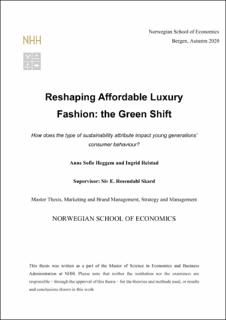Reshaping affordable luxury fashion : the green shift : how does the type of sustainability attribute impact young generations’ consumer behavior?
Abstract
Luxury fashion consumers are increasingly becoming more environmentally concerned and
consequently demand brands to meet their needs with responsible, yet luxurious products. This
trend is especially evident in Millennials and Generation Z, who are steadily becoming a key
consumer group for luxury brands. This thesis explores the way in which sustainable products
influence these young generations' product attitude and purchase intention in an emerging
segment of the luxury fashion industry, namely Affordable Luxury. Further, we aim to
establish whether the type of sustainability attribute, either related to the product itself or not,
cause distinctive reactions in the above mentioned parameters. Finally, the potential impact of
the product's ephemeral or durable nature is to be examined.
An online experiment was conducted to explore sustainable consumer behaviour in this
segment. Respondents were exposed to one of six variations of an affordable luxury product,
of either durable or ephemeral nature and with a product sustainability attribute that was either
product-related or non-product-related or alternatively, a conventional product. Perceptions of
the product's quality and social value were consequently measured, followed by an assessment
of their product attitude and purchase intention.
Findings indicate that young consumers have positive attitudes toward sustainable, affordable
luxury products. This effect only extends to purchase intention in certain contexts. Even still,
respondents perceived sustainable products to have a higher social value and product quality
than conventional ones, which in turn led to more positive attitudes and higher purchase
intentions. Differences between the type of sustainability attributes were established, and
respondents displayed a more favourable reaction to products with product-related
sustainability attributes over those that are non-product-related. The category the product
belongs to does not impact the attributes' effect on perceived product quality.
This thesis contributes to the field of sustainable luxury consumer behaviour by providing
insights into an emerging segment and a new consumer group. Managers of affordable luxury
brands should focus on introducing sustainable products with product-related sustainability
attributes to reap the benefits of heightened perceptions of quality and social value, which in
turn leads to more positive product attitudes and higher purchase intentions.
